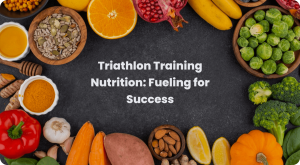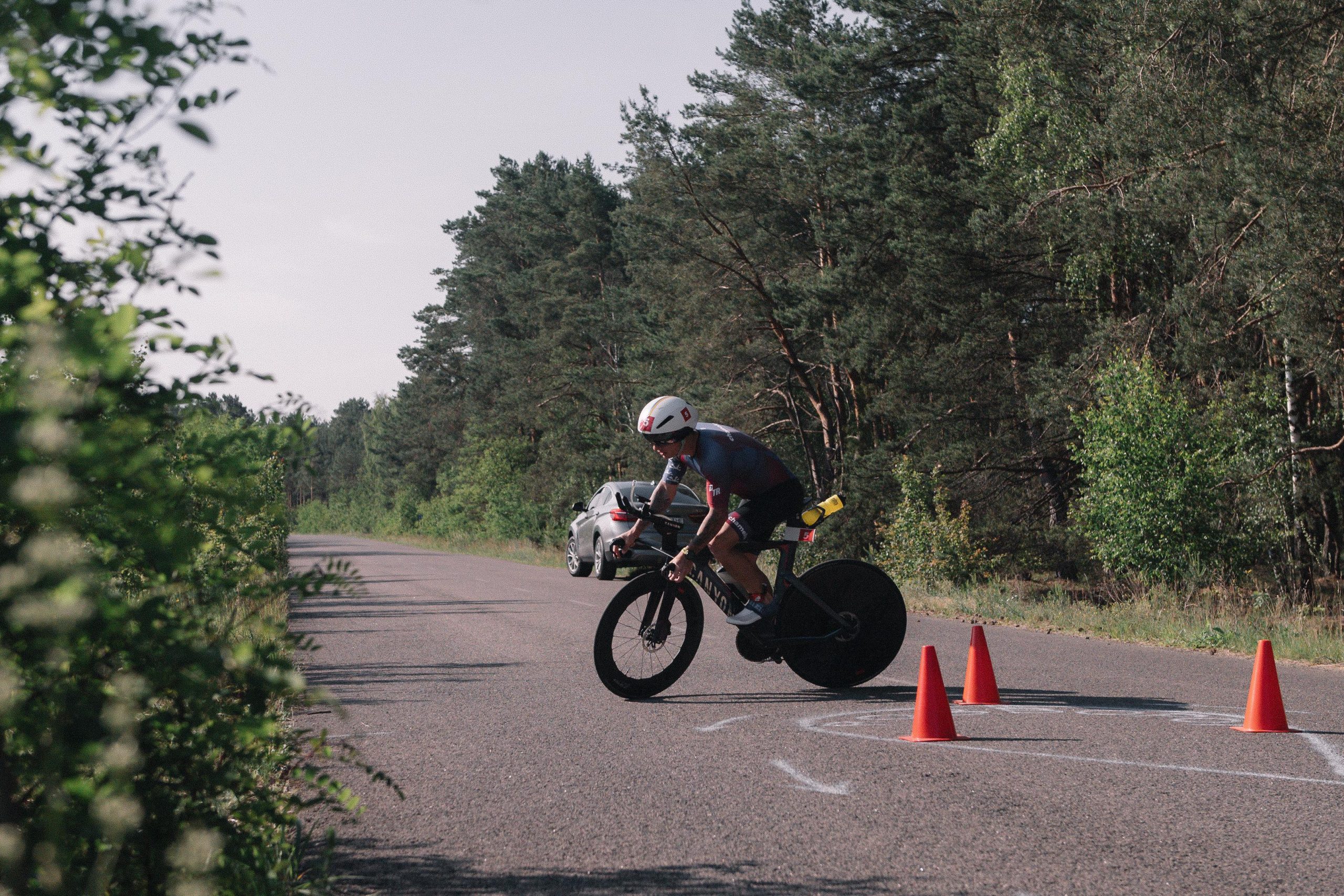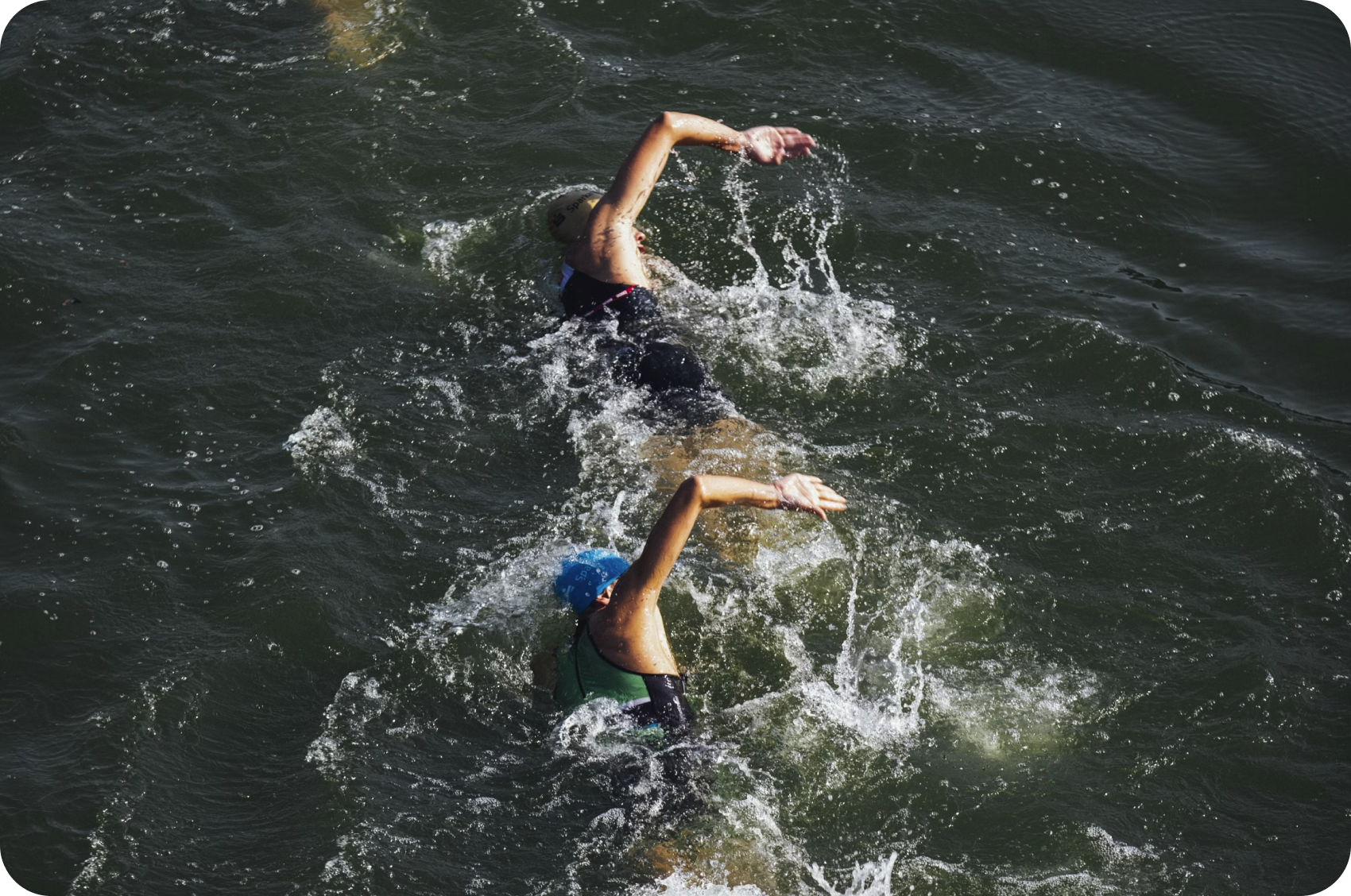Triathlons are tough races where athletes swim, cycle, and run, testing their endurance and determination.
These events push athletes to their limits physically and mentally as they tackle three different activities in one race.
Every second matters, and winning or losing can be very close. In this article, we will focus on a fourth discipline in triathlon that is crucial to training and performance: nutrition.
While talent and giving your best at each training session are important, having the right nutrition strategy is essential for improving performance.
We’ll explore the significance of macronutrients and hydration, along with effective ways to refuel during the race. These factors can make a big difference for triathletes. Let’s begin!
Triathlon Nutrition Plan: The Importance of Macronutrients
Whether you are getting ready for a sprint race or an Olympic distance triathlon, your body needs fuel to keep going strong.
Macronutrients, like carbs, protein, and fat, are the main sources of this fuel. They’re like the building blocks for your energy.
Each of these nutrients plays an important role in optimizing triathlon performance.
Let’s explore how it works.

Types of Macronutrients
1. Carbohydrates
Carbohydrate-rich meal plan is the backbone of a triathlete’s daily diet.
Carbohydrates are the primary source of energy. Especially during high-intensity workouts and endurance events such as triathlons.
When consumed, carbohydrates are broken down into glucose, which is readily available for immediate energy.
Triathletes rely on this fast and readily available source of fuel.
It provides energy during the swimming, cycling, and running stages of the race.
Research has shown that carb loading has a significant impact on endurance and performance.
Many triathletes make it a cornerstone of their Ironman’s nutrition strategy.
What is a daily carbohydrate intake norm for triathletes?
A general recommendation for triathletes is to aim for about 6 to 10 grams of carbohydrates per kilogram of body weight each day.
This means if you weigh 70 kilograms (about 154 pounds), you might aim for 420 to 700 grams of carbohydrates daily.
However, individual needs can vary based on factors like training volume, intensity, and personal digestive system.
Feel free to experiment and find the carbohydrate intake level that works best for your performance and overall well-being.
You can also consult with a sports nutritionist or dietitian for personalized guidance based on your specific needs and goals.
2. Proteins
Proteins are muscle builders and repairers.
During intense physical activity in training and racing, muscles are stressed and damaged.
Proteins come into play to repair and rebuild these tissues, promoting muscle recovery and growth.
For triathletes, protein intake plays a vital role in preventing overuse injuries and promoting rapid recovery between workouts.

3. Fats
Fats, which are often misunderstood, are hidden energy stores for athletes.
While carbohydrates provide quick bursts of energy, good fats serve as a long-term source of fuel for the body.
During long sessions, like those tough Ironman races, fats become important for giving a steady stream of energy.
Triathletes can use this energy source to boost their endurance, especially if they include healthy fats in their meals, like nuts, avocados, peanut butter, red fish, or olive oil.
When it comes to nutrition for triathletes, there’s no one-size-fits-all approach. The ideal mix of carbs, protein, and fats can vary based on things like how hard you train, your body type, and what you want to achieve in your races.
Most athletes shoot for a balance of 60-70% carbs, 15-20% protein, and 15-20% fat. But these numbers aren’t set in stone; they can change depending on what works best for you.
In the next section, we’ll take a deeper dive into the lifeblood of triathlon – hydration.
Hydration: The Lifeline of Triathlon Performance
Proper hydration isn’t just about drinking water. It’s about maintaining the right balance of fluids and electrolytes, like sodium and potassium, in your body.
This balance is essential for keeping your muscles working, your mind sharp, and your energy levels up during the race.
1. Dehydration
Dehydration in the context of a triathlete diet is like trying to go on a long journey with an empty fuel tank – it’s a recipe for disaster.
The consequences of dehydration during a triathlon can be serious.
They jeopardize not only athletic performance but also the athlete’s well-being.
2. Maintaining Electrolyte Balance
Sweating during physical activity causes the body to lose not only water but also important electrolytes such as sodium, potassium, and magnesium.
Maintaining electrolyte balance is crucial for many processes.
Namely, nerve function, muscle contraction, and overall body homeostasis.
When this balance is disrupted by dehydration, it can lead to cramps and muscle fatigue.
It can even lead to heat-related illnesses such as heat exhaustion or heat stroke.
Read our expert breakdown of magnesium’s role in muscle recovery and performance in our article on magnesium for athletes.
3. An Effective Hydration Strategy
An effective hydration strategy is a lifeline for a triathlete.
Proper hydration begins long before the race when athletes ensure they drink enough water in the days leading up to the event.
During the race, the goal is to replenish fluids lost through sweat and maintain electrolyte balance.
Athletes often use a combination of water and electrolyte-rich sports drink.
This is necessary to achieve this delicate balance.
4. Statistics
Statistics emphasize the critical importance of hydration to athletic performance.
Even mild dehydration, equivalent to a loss of 2% of body weight, can lead to a marked decrease in physical and cognitive performance.
In the demanding world of triathlon, where seconds count, and mental clarity is as vital as physical endurance, the stakes are high.
Strategic Fueling: The Race within the Race
In the world of triathlon, a race is not just a test of endurance. It is also a fight against time and the limitations of the human body.
Fueling strategies during a triathlon are the unsung heroes.
They can mean the difference between reaching peak performance and hitting a wall.

1. Exhaustion in Triathlon
The concept of “exhaustion” is a triathlete’s worst nightmare.
A sudden and severe depletion of energy leads to a catastrophic drop in performance.
It’s like running on empty, both physically and mentally.
This often happens when glycogen stores are depleted.
The reason is the athlete feels tired and disoriented and tries to keep running.
2. Loss of Strength
Avoiding a “loss of strength” requires careful planning.
A pre-race triathlon nutrition plan is key in ensuring that the body has enough energy and is ready for the challenges ahead.
Athletes often choose carbohydrate-rich foods as a pre-workout meal and a few hours before a race to replenish glycogen stores.
Most often, these are oatmeal, sweet potatoes, bananas and other fruit, and energy bars.
But the race itself is where strategic fuel really shines.
Energy gels, bars, drinks, and other sports nutrition become triathletes’ allies.
They provide a quick and easily digestible source of carbohydrates during the race.
These products are designed to provide a quick energy boost.
It also prevents the dreaded “bonk” and maintains performance levels.

Nutrition Planning: From Training to Race Day
The intricate dance of training and nutrition is a pivotal component of a triathlete’s journey.
It’s the harmonious relationship between what’s consumed and how it powers each stroke, pedal, and step on the long road to race day.
1. Role of Nutrition in Daily Training Routines
In daily training routines, a triathlete’s diet takes center stage.
It’s not merely about fueling workouts.
It’s about optimizing performance, promoting recovery, and building resilience.
Triathletes often engage in periodization.
This is a structured approach to training and nutrition for triathletes.
It is aligned with the different phases of the training cycle.
During heavy training blocks, nutrient intake is adjusted. Especially to support increased energy expenditure and muscle recovery.
In contrast, recovery nutrition may focus on rebuilding glycogen stores and minimizing muscle soreness.
2. Importance of Periodization and Meal Timing in Training
Meal timing within the training routine is a finely tuned instrument.
Athletes often consume a combination of carbohydrates and proteins before and after workouts.
It helps maximize energy and muscle repair.
This strategic timing enhances the benefits of training.
It ensures each session contributes to overall performance gains.

3. What to Eat Pre Race?
Race day nutrition plans are meticulously crafted blueprints for success.
They consider factors like the race’s duration, weather conditions, and individual preferences.
Athletes plan their intake of carbohydrates, fluids, and electrolytes to align with the race’s demands.
It helps to avoid energy fluctuations and maintain a steady pace.
Check out this pre-event meal plan for a better understanding of what your race day diet should look like.
Case Studies: Success Stories Through Nutrition
The transformative power of nutrition for triathletes’ performance is not just a theoretical concept
It’s a reality witnessed through the inspiring journeys of triathletes who have harnessed the potential of optimal nutrition.
1. Examples of Triathletes
Consider the case of Sarah, an amateur triathlete who struggled with energy crashes during long training sessions.
After consulting with a nutritionist, she implemented a carbohydrate-loading strategy before her races.
The result? Sarah not only completed her races with more energy but also shaved minutes off her previous race times.
Her story exemplifies the tangible impact of nutrition on performance.
2. Statistics on Performance Improvements
Statistics further validate the significance of nutritional improvements.
Studies have shown that athletes who adhere to well-structured nutrition plans experience notable performance enhancements.
From improved race times to increased endurance and reduced risk of injury.
These numbers speak volumes about the role of nutrition in triathletes’ success.
In the upcoming section, we’ll uncover the strategies that triathletes employ to navigate these dietary challenges successfully.
Challenges and Dietary Restrictions: Navigating the Triathlon Nutrition Landscape
Triathlon nutrition is not a one-size-fits-all endeavor.
It’s a dynamic landscape filled with diverse challenges and dietary restrictions that athletes must navigate.
The principles of healthy eating remain the same.
However, triathletes often face unique situations that require creative solutions.

Common Challenges Triathletes Face
1. Dietary Restrictions
One common challenge many athletes face is dietary restrictions.
Triathletes with dietary restrictions such as vegetarianism or gluten intolerance must adapt their triathlon nutrition plans accordingly.
For vegetarians, ensuring an adequate intake of essential nutrients like protein and iron can be a concern.
Gluten-sensitive athletes need to carefully select gluten-free carbohydrate sources to maintain energy levels.
If you have any dietary restrictions, you can seek expert nutrition advice to get the most out of your diet.
2. Adapting Nutrition Plans
Adapting triathlon training nutrition to accommodate these challenges requires a thoughtful approach.
Vegetarian triathletes, for instance, can find alternative protein sources. Such as tofu, tempeh, and legumes.
Gluten-free athletes can opt for gluten-free grains like quinoa and rice.
It’s about finding substitutions and alternative food choices that align with an athlete’s dietary preferences and needs.
3. Guidance on Adapting Nutrition Plans
Expert advice plays a crucial role in helping triathletes.
They help you overcome these nutritional obstacles.
Nutritionists and dietitians can provide guidance tailored to individual circumstances.
For example, they can recommend special supplements for vegetarians.
This is to meet their nutritional needs.
They can also give advice on choosing gluten-free sources of carbohydrates that are easy to digest during the race.
With dietary challenges addressed and nutritional strategies fine-tuned, triathletes are poised to optimize their performance and embark on their race day with confidence.
Yet, the journey doesn’t end at the finish line; there’s a broader context to consider.
Conclusion: Fueling Triumph in Triathlons
In the world of triathlons, where every second counts, the role of nutrition is not just important—it’s pivotal.
The journey from the water to the bike to the run demands precision and endurance.
It’s nutrition that serves as the fuel for this extraordinary endeavor.
As we’ve explored in this article, macronutrients provide energy, proteins facilitate recovery, and fats offer endurance.
Hydration is the lifeline that prevents depletion and exhaustion.
Strategic fueling strategies act as a race within the race, ensuring that athletes avoid the dreaded bonk and perform at their best.
Triathletes, both seasoned and newcomers, are encouraged to prioritize nutrition as a key component of their training and racing journey.
It’s the investment that pays dividends in performance and endurance.
Athletes can reach their full potential and conquer the extraordinary triathlon challenge.
By understanding the importance of macronutrients, mastering the art of hydration, and applying strategic nutrition.
With proper nutrition as an ally, triathletes embark on a triumphant journey.






